Written by Joseba Elola
El País, translated by Jérôme Roos
RoarMag
May 24, 2011
El País, translated by Jérôme Roos
RoarMag
May 24, 2011
A reporter for El País spent a week at the heart of the #spanishrevolution, and wrote this incredible piece, translated into English for the first time here.
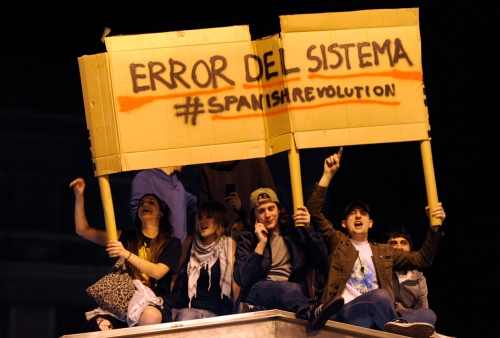
Jon Aguirre Such gave a hug through clenched teeth. He could not contain his excitement, the accumulated anger, the shared indignation. He was living a dream. A dream that has come true. The dream of many. This articulate and well-spoken young man, a 26-year old architecture student, and now a spokesman for Real Democracy Now, was hugging tightly and angrily. It happened on Tuesday the 17th. Magic Tuesday. At eight o’clock in the afternoon. In the Puerta del Sol.
Yes, because Tuesday revealed the magic of spontaneity. The miracle of communication. The power of spreading the message through social networks. The strength of a new generation.
The drowning feeling of indignation burst at the seams.
Jon had already been moved on Sunday, while leading the demonstration on May 15th. Arriving at the height of the Círculo de Bellas Artes, in Alcalá Street in Madrid, he looked back: it was full of people all the way to Cibeles. ”I almost started to cry. I looked at everyone in amazement: ‘It is possible!”. Jon tells his story with pride, with passion: “We just wrote history. There is no going back.”
Jon Aguirre Such, with its flowered shirt and black jacket, with his thin mustache and his neat black boots, does not obey the classic profile of the antisistema. Neither did the overwhelming majority of those who spontaneously joined the protest, which devoured the political campaigns and transformed all electoral marketing into plastic.
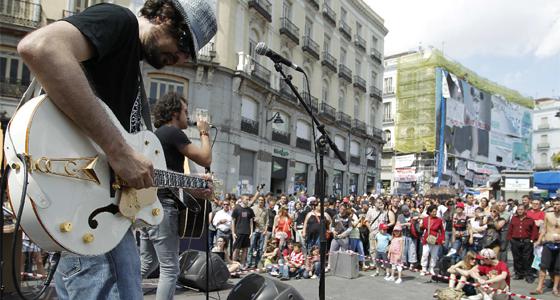
Act fun in sun / Christopher Manuel
People. Lots of people. Colorful people. Of all colors. This is how they are portrayed by El Roto, the teacher. Carrying a large white banner: “The young people took to the streets and suddenly all the political parties got old…”. It’s difficult to express more with less. It’s difficult to better summarize the desire and common feeling of indignation. The cartoon was published on Wednesday, May 18th, in El País. The next day was Magical Tuesday. The indignados made it theirs. That same night, they jumped, reaching out for the streetlights of the Puerta del Sol.
The eyes of young people around the world are all watching the unusual warriors of Don Carlos.
Tuesday the 17th was magical. Magical because nothing had been prepared. Fed by social networks, a spontaneous demonstration bloomed into existence. The 15-M protests, by contrast, had been the fruit of conscious and conscientious labor. Three months of preparation. Tuesday was something else. Something new. Something different.
For Fabio Gándara, the most visible face of Real Democracy Now, it was clear from the beginning, back in December. In the Facebook group in which the 15-M Movement was starting to be born, he was a rush to hold demonstrations. “Some said, ‘Let’s wait. Organizing a protest like this is difficult. Civil society is asleep. Let’s wait three months, let’s work on it.”
Civil society has woken up. Or rather, a part of it. With the youngest at the front. With those who want to be the present and not the future. The millions of unemployed, those who can’t find work, those whose mortgages are on the verge of foreclosure, those who have to fear the arrival of each new bill, those affected by the cuts, disappointed by the poverty of political discourse, outraged by the electoral marketing. A well-educated generation, grown-up in the shadow of San Google, has decided to take to the streets.
How is it possible that such a rude awakening occurred in so little time? Some of those from the ‘analogue world’ have trouble understanding the dynamics of networks. Instantaneous propagation and viral messages. Feedback, the contagion effect, the multiplier effect. Some of those from the analogue world have difficulty understanding how it is possible to operate a flat structure, without leaders or hierarchy. Where everyone contributes. Where everyone feels included.
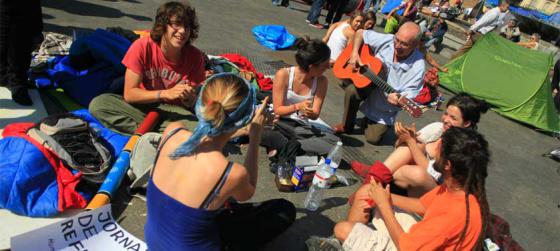
The Puerta del Sol, on Sunday morning. / CHRISTOPHER MANUEL
“They are assemblies of 24 hours a day, seven days a week,” explains Olmo Gálvez, one of the social media wizzkids of Real Democracy Now. “The information is updated, the ideas are added, in a chaotic kind of way, but it works, it yields results. It is as if the network has its own thinking brain. Proposals are made, we reach an agreement and we work.” Olmo Galvez, a 30-year old from Granada working for technological companies, had never attended a demonstration so far. He went to an Opus Dei school and studied business at the ICADE. He is now a part of Democracia Real Ya — or DRY, for those in the know, pronounced the English way. ”I never understood taking to the streets just for the kick of it. The important thing is that the demonstrations are about meeting and connecting with people, and from there things will move forward.” Things, it turns out, have already begun to move forward.
Tuesday the 17th was magical. Magical because nothing had been prepared.
“About 18 or 20 dudes with a budget of $1,000.” Thus it all started, says Chema Ruiz, spokesman for Madrid’s Platform for those Affected by their Mortgage (PAH), with half a smile on his face. His organization joined DRY two months ago. “We found an assembly-like movement without leaders, a heterogeneous group of people, hopeful of changing things.” So it went.Fabio Gándara, the man at the origin of it all, a 26-year old lawyer, started the social mobilization project with two friends: Eric Perez and another person who prefers to remain anonymous. In early December there were already about ten people with the same idea. They looked to Iceland. To a society with a strong democratic commitment that had been capable of imprisoning some of those responsible for the crisis, of promoting constitutional reforms. “We saw that the public could change things,” he says, his eyes alert — this young man who came to Madrid from Santiago de Compostela to study law and political science. They looked to the Arab world and watched dysfunctional societies articulating protests through social media. They created a Facebook group, Youth in Action, and a blog.
In January, the base expanded and was opened to social organizations. Its proposal was flattened out a bit further. A new Facebook group was created and inconcisely baptized the ‘Platform for the Coordination of Groups for Citizen Mobilization’. Spontaneously, bloggers were added, as well as members of the citizens’ movement State of Discontent, the Don’t Vote for Them platform — that advocates not to vote for parties that supported the Act Sinde… The list was growing, growing, growing.
The debate between the networks led to the sharing of a number of ideas: outrage at the citizens being forgotten in the crisis, the perversion of the democratic system leading to a bipartisan model, markets imposing antisocial cuts. Bottom line? ”There are two main culprits: the politicians, our supposed representatives, acting in collusion with the major economic powers, and the economic powers themselves, which influence the major political parties, impose a framework of deregulation and speculate on the country bonds,” sums up Gándara. And that’s how they got to their slogan, one of the keys to embracing so many different viewpoints: “Real Democracy Now: we are not goods in the hands of politicians and bankers.”
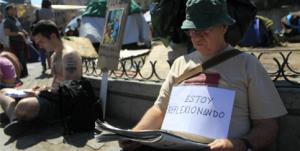
The slogan quickly became the name of the platform.
A website was created. The movement decentralized. The list of organizations supporting the initiative was getting fatter every day. Everything was being cooked on the Net.
In mid-March, the first local assemblies were convened. The Granada House was the place where the first meeting in Madrid was held. ”There were moments of great enthusiasm. It was rare to meet face to face. All this has turned into something real,” says Gándara. ”We found that people were very different but we agreed on the basics.”
On May 2nd, a meeting was held in the Retiro. 300 people showed up. Priorities were set, anyone who wanted to could talk. ”It was like the speaker’s corner,” Merche Negro – DRY collaborator in communication and head of the audiovisual platform Vudeo.org citizen – recalls, referring to the famous London space for free expression.
Youth Without A Future, the Association of the Unemployed, ADESORG, Don’t Vote for Them, and the ATTAC platform transformed themselves into the engines of the movement. Oxfam and bloggers like Enrique Dans also appeared in the long list of adherents. A multitude of websites stamped their URL’s on the DRY platform.
A week after the demonstration, the vibrations could not be better. The pieces were starting to add up, miraculously, like a game of Tetris. If you needed a sign, someone would show up with one. And as such it arose on May 15, 2011, a date that will go down in history as one of the great successes of citizen mobilization outside of the established political parties and trade unions. More than 80,000 indignados took to the streets all over Spain.
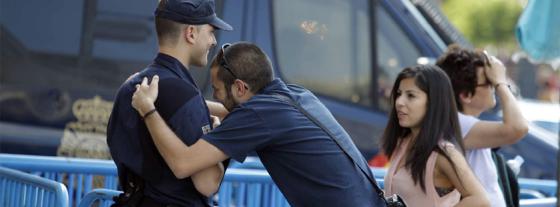
One of the people who came to Puera del Sol hugged one of the policemen deployed there. / LUIS SEVILLANO
Juan Cobo, a 26-year old photographer, returns home that night with a smile from ear to ear. What he has just gone through is unbelievable. He listened to the people of Real Democracy Now and recognized his own voice. When he gets home and hears about the riots, he has moment of huge disappointment. Well, once again, business as usual. But no, this has not been business as usual. This has been something new. Something different.
It’s four in the morning. Juan Cobo is so restless that he decides to return to the Puerta del Sol to thank those who have stayed there overnight. Thank them for enduring.
He arrives at the square and there are about 35 people there. They’re sleeping, they’re getting organized. As they have been doing every night of the week. Working when others sleep. Discussing, agreeing, taking action.
He can’t move away from this. He has never been associated with any social movements. But this is something unique. There is dialog, people listen. There are no leaders, one can truly feel part of the process. The Acampada Sol is being born.
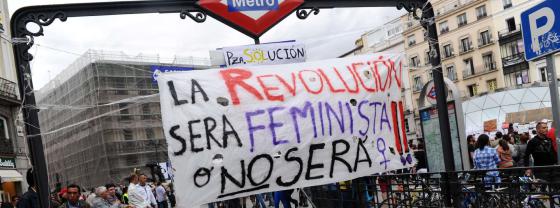
Banner at the entrance to the subway. / Dominique Faget (AFP)
Real Democracy Now is moved to the side. They continue to support what is beginning to take shape there, but pass on the torch to the campers. Juan Cobo is one of them. He’ll be their spokesman.
Monday, four in the afternoon, Puerta del Sol. They have just set up a small bar, a tent. It is located near the bear and the strawberry tree, in the northeast of the square. The birth a mini-republic, Acampada Sol, is brewing. There is excitement there, lots of movement: water and juice into the small tent, documents going from hand to hand. At the other end of the square, a PP candidate kicks off his small campaign rally near Preciados street, in a blue tent that has little to do with the indignados. Just about fifteen people listen to him. It seems that he is crying in the wilderness.
At eight o’clock in the afternoon the assembly starts. There are a hundred people sitting on the floor. People of all stripes. Mostly young. Some come wearing Ralph Lauren polos, others torn t-shirts without sleeves. The neat boy exchanges ideas with the hippie. Talking. They’re different, but there’s one thing that unites them. They’re tired of this deceit, they are tired of being the political puppets of simplistic slogans, of the accused politicians on the lists. Chorus: “They call it democracy and it’s not.”
They discuss the possibility of being evicted if they stay to sleep another night. On whether it is worthwhile to keep the tent, which may be a reason to throw them out. Chorus: “We have no fear.” A young man takes the megaphone. “We are not Ni-Nis [neither student nor employed], I have two careers.” They applaud. ”There are camps in Seville and Valencia,” he announces, “we must carry on!”.
One of the organizers proceeds to read the manifesto which they adopted. This is the best way to know who they are, something that people have been asking throughout the week:
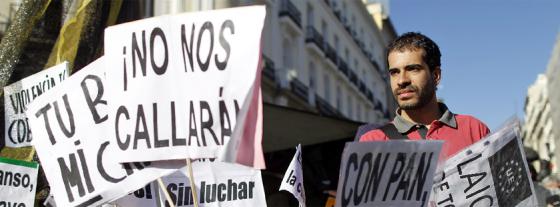
Fabio Gandara. / SAMUEL SANCHEZ
“Who we are: we are people who came here freely and voluntarily, who after the demonstration decided to come back together to keep reclaiming dignity and social and political consciousness. We do not represent any party or association. We are united by a call for change. We are here for dignity and in solidarity with those who can not be here.”
“Why are we here? We are here because we want a new society that prioritizes life over economic and political interests. We advocate a change in society and social consciousness. To show that society has not fallen asleep and will continue to fight for what we deserve by peaceful means. We support the comrades who were arrested after the demonstration, and ask for their release without charges. We want it all, we want it now, if you agree with us: JOIN! It’s better to try and lose than losing because we didn’t even try.”
The assembly burst out into singing. Acampada Sol has been united around this text. Passers-by stay and listen. Each time, more eyes and more ears are added. A veteran, attending the meeting standing up, asks for the megaphone. ”Friends, friends, I congratulate you because you’re doing a great exercise of citizenship,” he says, “Article 23 of the Constitution protects you.” Young people applaud enthusiastically. The movement is already breaking down generational barriers.
Night has fallen and there are about 400 people in the Puerta del Sol. They will sleep here tonight. From now on, no one will budge.
Paco Lopez arrives with a big bag to spend the night in the square. He is 47 years old and unemployed. He’s a licensed stonemason, an actor, a conscious man. In his bag: a book, Reaction, two water bottles, a green mat and a blue cover, just like those on the airplane. He is outraged. ”People are tired of all the cynicism, so much hypocrisy, so much political manipulation. Before, you had principles. The politicians had a vocation to serve and be humble, not a system for generating privileges. It looks like we’re restoring the feudal system!” Paco is getting angry. He lives on the 426 euros per month he gets in unemployment benefits. ”There are five million unemployed people. Those of us over 45 years of age are hopeless. People should be more important than the profits of corporations!”
Monday ends with a figure that’s just a prelude to what still lies ahead. There are few protesters at the square, but the social media are seething with people. The #spanishrevolution hashtag becomes a leading subject of discussion on Twitter. But not only in Spain: #spanishrevolution is a trending topic worldwide.
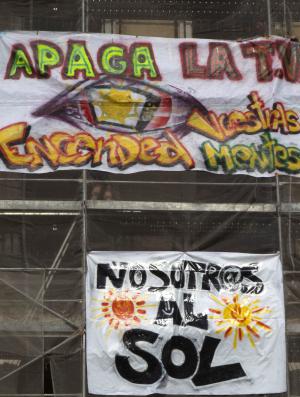
In the early hours of Monday to Tuesday, the police intervention take place. They evict the campers. Those who spent the night there denounce the use of violence by police officers. They say they’ve been kicked, punched, beaten.
The afternoon is passing. Slowly, steadily, people are being added, and added, and added. At 8pm, the Puerta del Sol is full. Where yesterday at eight o’clock there were some 400, now there are 6,000. “Looks like it will be difficult to carry out this Assembly”, they sarcastically say from the speakers, placed under Carlos III. They burst out in euphoria. “We’re staying in the plaza, we have no home,” goes the chorus. “We’re on Facebook, we’re on the street.” At 21.29 the loudspeaker proclaimed: “Now we have the power now and the world is looking at us!”
The dream has come true. The #spanishrevolution has begun.
At 23.30, the volunteers glue cartons on the floor for everyone who can to stay the night. Chinese vendors are going around selling beer. The statue of Carlos III starts to grow tails, blue canvases unfolding around him. Some people have already brought a couch.
Megaphone: “this is not a disco, do not drink alcohol. We are not at a party, we are here to demand our rights.” At 3am, a new assembly is held.
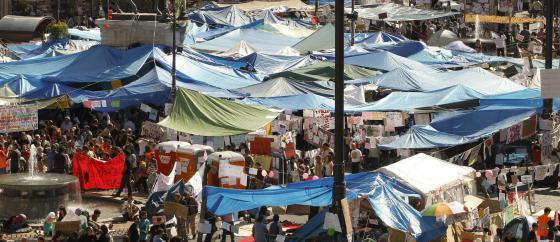
Camp installed on Puerta del Sol / JCHidalgo (EFE)
Maps of the city-in-planning indicate where each of the committees are. One near each of the lampposts in the square: Power, Action, Extension, Internal Coordination, Legal, Care/Cleaning, Infrastructure (lost items), Communication. The infirmary is full of medicine and bandages. Every night, bars and restaurants in the area give the campers everything they can spare. At the food place, housewives arrive with full shopping carts. A restaurant owner brings pots full of stew.
The website tomalaplaza.net contains all the squares in Spain that have joined the revolt. The internet does not stop boiling. New hashtags are being created, new labels so the protest will stay alive on Twitter, to keep it a trending topic. Using a single hashtag means that the algorithm of the trending topics ‘get tired’ of the label and open the way for new ones. The hashtags of the indignados change around: #spanishrevolution, #acampadasol, #nonosvamos, #yeswecamp, #democraciarealya, #notenemosmiedo, #tomalaplaza, #pijamabloc. The hashtags are also decentralized: #acampadabcn, #acampadavalencia.
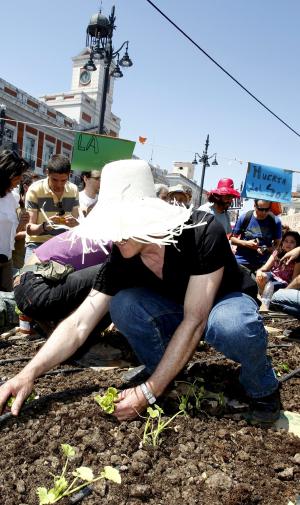
The protest spread throughout Spain. And other cities throughout the world (SEE HERE!). In front of the Spanish embassies in London and Brussels young Spaniards come together in support of the #spanishrevolution.
On Wednesday, the Madrid Provincial Electoral Board bans all rallies. In the afternoon, the police is present in the square. The agents have loaded the bars over their trucks and they do bag-checks at the entrance. But the movement is unstoppable. It continues to grow, defying the protest ban. At 8pm, a growing number of adults, seniors, immigrants, and grandparents arrive at the gathering. ”No, no, they do not represent us,” they shout in the square. The multiplier effect of the protest has no barriers. ”This does not end with the elections,” they exclaim.
The rain delights in tormenting Puerta del Sol that night. But that does not dissuade the indignados. ”Rain or shine, here nobody moves.” Hundreds of protesters hold up under the improvised blue tents that are overcome by the weight of the water. The cartoon of El Roto hangs from several lamps in the square.
The drafting of a manifesto is one of the pitfalls that the gathering must resolve. In the assemblies, it’s difficult to agree upon the whole world. Many ideas are suggested: reforming the law to create a more proportional electoral system, a review of party funding, income redistribution via progressive taxes, establishing a Tobin tax on capital flows, clearing electoral lists of politicians accused of corruption, have open lists, eliminating the life-long salary for politicians, abolition of the Sinde Law, the Aliens Act, the Bologna Process. The mini-republic continues to grow and the contagion effect is gaining strength throughout Spain. In Valencia, the number of visitors triples with each passing day. On Thursday, at 19.30, there are a total of 82 cities that have requested a room on the tomalaplaza.net website. The international press looks to Spain. The Washington Post puts the Spanish protests on its cover.
Friday, 12.25 noon. The mini-republic is a mini-city. The tents and sofas have multiplied. ”Do you know where Respect is?” asks a young man in the Graphic Arts workshop. ”I don’t know, go to Action and ask.”
The signs keep getting better. There is a plastic Tupperware filled with markers to improve the appearance of the messages. The long blue skirts of Carlos III continue to flourish. Next to the bear and the strawberry tree a popular forum has sprung forth.
There are now 166 cities worldwide that attract protests. With 40,000 fans, the number of Twitter followers of @democraciareal exceeded the sum of @ppopular and @psoe. A black and orange sign on the square, one of those used to sell or rent apartments, reads: “Slave labor for rent. 600 euros a month.” Someone has removed the 600 and jotted down 400.
On Friday night the big moment arrives, the moment of silence that makes way for a day of reflection. People do not fit in the square anymore, all the streets leading towards it are bursting. At midnight there is silence. More than 25,000 people, many with their mouths covered with tape, shut up in unison. Silence. You can hear the bells of the clock from Puerta del Sol. The minute does not last a minute. The screaming goes out of control soon. Hands are raised with turning wrists, the symbol of approval used in the assemblies. Strangers hug, some with tears in his eyes. In Valencia, the numbers of protesters also runs wild: more than 10,000 people are in the Plaza del Ayuntamiento.
Every day, there are more people, the numbers are multiplying. Yesterday there were 300 requests at the tomalaplaza.net domain. 200 lawyers were appointed to the Camping de Sol. A total of 15 nurses. Seven solar panels, 15 computers. The squares kept filling up with people all Saturday night. Despite the protest ban on the day of reflection. The phenomenon continued to grow, adding more people, unstoppable.
“There has been a very rapid disintegration of society,” said Miguel Martinez, a sociologist and expert in social movements, professor at Complutense University. ”The insecurity has emanated from the political elites, who have tightened the screws every day. Different governments have pursued policies that were very aggressive for most people. The picture is very sad. There had to be some kind of safety valve. The people feel that their life has become volatile. When the indignation finally comes, you can’t go on anymore because they make you disappear as a person. When you lose your dignity, you’re just labor.”
No comments:
Post a Comment